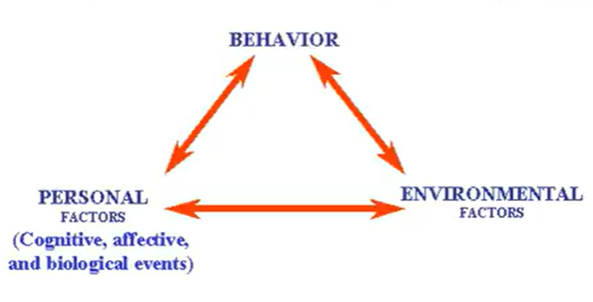SAS 1 - Albert Bandura's Agentic Perspective of Understanding the Self
1/27
There's no tags or description
Looks like no tags are added yet.
Name | Mastery | Learn | Test | Matching | Spaced | Call with Kai |
|---|
No analytics yet
Send a link to your students to track their progress
28 Terms
Albert Bandura
professor from Stanford University
developed the Social Cognitive Theory
Basic Assumptions of Social Cognitive Theory
Social Cognitive Theory takes an Agentic View of the Human Person
Humans have the Flexibility to Learn Behaviors in Diverse Situations, Particularly through Observational Learning
People have the Capacity to Regulate their Lives through the Triadic Reciprocal Causation
People Regulated their Conduct through both Internal and External Factors
When People Find Themselves in Ambiguous Situations, They Typically Attempt to Regulate their Behavior through Moral Agency
Social Cognitive Theory takes an Agentic View of the Human Person
people are self-organizing, proactive, self-reflecting, and self-regulating, not just reactive organisms shaped and shephered by external events
Human Agency
self-efficacy
collective efficacy
proxy efficacy
Self-efficacy
people’s beliefs in their own capabilities to exercise some measure of control over their functioning and environmental events
Collective Efficacy
a group’s shared belief in its conjoint capability to organize and execute courses of action required to produce given levels of attainment
Proxy Efficacy
getting people who have expertise or power to act on their behalf to get the outcomes they desire
Sources of Efficacy
Mastery Experiences
Vicarious
Social Persuasion
Mastery Experiences
achieved by tackling problems in successive attainable steps
Vicarious Experiences
when we see other people like ourselves succeed by sustained effort, we come to believe that we, too, have the capacity to succeed
Social Persuasion
if people are persuaded that they have what it takes to succeed, they exert more effort and are more persevering than if they harbor self-doubts and dwell on personal deficiencies when problems arise
Observational Learning
a relatively permanent change in behavior due to the experience of observing a model
Processes in Observational Learning
Attention
Retention
Behavioral Production
Motivation
Attention
the model performing the behavior should be noticed
Retention
the behavior performed by the model should be remembered
Behavioral Production
the learner must be able to convert the retained information into action
Motivation
the learner must have the will power to perform the behavior
The Bobo Doll Experiment
this is an example of observational learning
demonstrated that children learn aggressive behavior through observation and imitation
involved preschool children observing adults interact with an inflatable clown doll, known as a Bobo doll, in aggressive or non-aggressive ways
People have the Capacity to Regulate their Lives through the Triadic Reciprocal Causation
people’s behaviors and thoughts affect and are effected by the social context
Bandura’s Triadic Reciprocal Causation
Behavior ←→ Personal Factors ←→ Environmental Factors ←→ Behavior

External Factors in Regulating our Behaviors
feedback from parents
reinforcements for good behavior
praises and encouragements from professors and friends
Internal Factors in Regulating our Behaviors
self-observation
judgmental process
self-reaction
Self-Observation
monitoring our own performance or personal standards
Judgmental Process
comparing our performance to others
Self-Reaction
responding positively or negatively to our behaviors depending on how they measure to our personal standards
When People Find Themselves in Ambiguous Situations, They Typically Attempt to Regulate their Behavior through Moral Agency
redefining behavior, disregarding or distorting the consequences of behavior, dehumanization, victim-blaming, and displacement or diffusion or responsibility
Fortuitous Events
an environmental experience that is unexpected and unintended
Chance Encounter
an unintended meeting of persons unfamiliar to each other